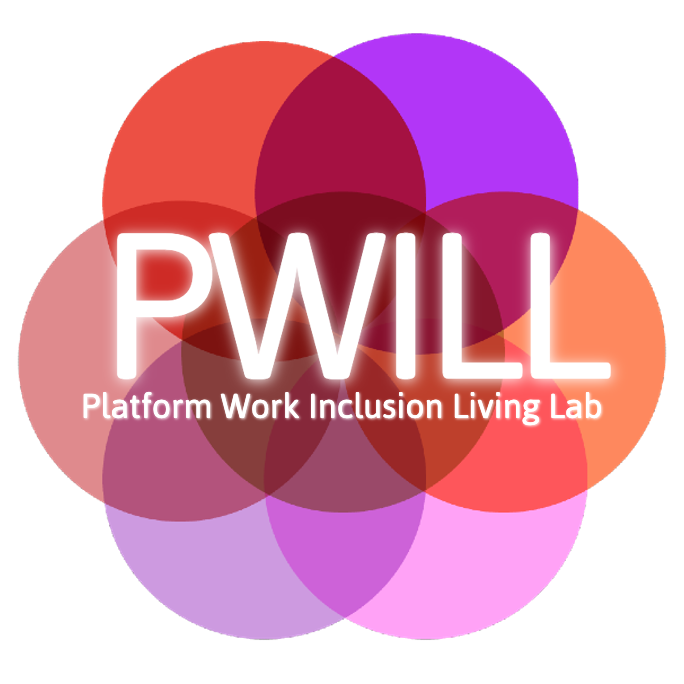NGOs and labour unions or associations are a vital part of the support and advocacy infrastructure for platform workers. Their role can, however, be complicated by the disparate nature of the workforce, especially in platform microwork, and the diverse needs of workers. An additional complication is the transnational nature of platforms and some forms of work, which may require cross-border advocacy.
Additionally, the politics of platform work intersect with other concerns such as housing, welfare rights, and health care, demanding – but also creating opportunities for – building cross-issue solidarity.
Contents
Labour unions and associations
Labour forms: Traditional trade unions need to bridge the gap between offline work and digitised work in representing and supporting their clients. Types of platform labour may be emerging and thus unfamiliar to trade unions; consequently, the issues faced by workers may be unique or unfamiliar. Some work may also be invisible, especially if happening in domestic settings, and thus mis-recognised as not being labour.
Defining workers: Many platform workers are also formally designated as self-employed and may fall out of traditional trade union definitions and/or labour regulations in certain jurisdictions. Some workers may be legitimately self-employed but are dependent on the platform and thus in need of protection. Additionally, some workers may value their designation as entrepreneur or self-employed and not align themselves readily with trade unions or labour associations – or misrecognise their worker status. Identifying and mobilising a coherent labour cohort can be challenging.
Collective bargaining may not be possible in the absence of formal employment contracts or be less available in some jurisdictions.
Gender politics: Trade unions and other labour organisations may be male-dominated and be run using methods associated with masculinised industrialised labour. They may not be well situated to identify the needs of, or build support systems for, the diverse range of workers in the platform economy, especially women workers. Feminist forms of organising may be marginalised.
Diversity of platform work and workers: Platform work is diverse in its forms and thus generates often contradictory sets of issues and concerns to be mediated by any Union.
Geographically distributed workforce: Workers may be geographically and culturally distant, reducing capacity for solidarity building.
Large-scale advocacy and interventions: Platform and labour regulation or advocacy are complicated by the transnational nature of many platform companies. Protests or strikes at national level may be less effective or only have limited effects. There are, however, opportunities to build international solidarity.
Information and knowledge of how platforms work to be able to support their members; feminist readings and re-interpretations of legal and policy documents; mapping of women and other minority groups as labour leaders; creation of support funds to train new leaders who use platforms; increase in transnational solidarity.
Migrant associations and networks
Migrant associations are not accustomed to dealing with platforms and digitised ways of working and might lack the specific information and knowledge on how platforms function crucial for them to support their members/communities. Migrants may also need material support in managing the structural demands for establishing platform profiles and managing financial systems.
On the other hand, due to the very solitary character of a lot of platform work, migrant associations have the potential to organise workers who share similar background characteristics. Migrants often use informal networks to navigate the structural difficulties of platform work such as digital access, identity information requirements, and payment systems.
Information and knowledge of how platforms and intermediary brokers work and the range of opportunities within the platform economy to be able to support their members; greater insight into the laws and regulations regarding workers’ migrant status and how this manifests in and shapes platform work; greater engagement with labour rights groups.
Feminist associations and networks
Alternative models: Feminist activism articulates alternative models of valuing and performing labour such as through equitable collaborative and cooperative frameworks and articulated through an ethics of care. They also offer alternative models for activating, mobilising, and supporting collective actions on both small and large scales. Feminist politics are also often articulated through goals of mutual aid. Mutual aid has been and can be a valuable tool for worker resistance as part of informal networks. Consequently, feminist activism offers valuable models for developing alternative platform work models as well as for understanding the current nature of platform work.
However these alternative approaches to organising and forms of organisation may not be recognised or respected by stakeholders in the platform economy or by more traditional trade unions. This may limit the capacity to advocate and lobby effectively.
Advocacy and visibility: Feminist associations are able to place women’s perspectives and women’s agendas centrally within discussions of platform work. However, the capacity of feminist associations to do so differs in national and regional contexts and engagement with labour may be outside the remit of some groups. Also, it is vital that this advocacy is intersectional and does not centralise gender as the only variable shaping labour contexts.
Labour: Not all feminist organisations are oriented towards questions of work, marginalised workers, or have knowledge of the specific dimensions of platform work.
Information and knowledge of how platforms function to be able to support their members; more research is needed on the experiences and needs of female-identifying workers in the platform economy; more political and academic attention for often overlooked feminised sectors such as paid care and domestic work; intersectional feminist approaches need to be embedded in feminist advocacy organisations; legitimation of feminist organisation, organising practices, and methods within labour advocacy contexts.
Informal labour support networks
Communication channels: Workers have a range of tools and mechanisms to engage in mutual support and solidarity activities, including chat platforms. These may happen via platform tools but often through alternate platforms. Workers actively use these to generate small-scale resistances and to find mechanisms to improve labour conditions. These channels may also resolve some of the problems caused by a geographically disparate workforce.
Mutual aid: Workers often engage in mutual aid, such as sharing worker accounts. These may be illegal or against platform policy.
Accommodation: The work of informal support networks may merely suture workers more closely into the labour environment, accommodating the existing system rather than advocating for structural change.
Recognition of the importance of informal support networks; legislation or regulation to regularise mutual aid labour; support for on-platform and off-platform communication channels.
The nature of platform work is broadly defined and constantly changing. We welcome suggestions of additions or amendments to this list. Please email
P-WILL@publicpolicy.rs
Produced by Working Group 1 members (WG leaders: Dr. Kylie Jarrett and Dr. Jing Hiah) with contributions from all working groups of the P-Will COST Action (CA21118)

